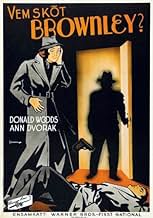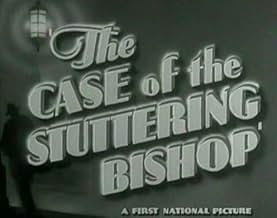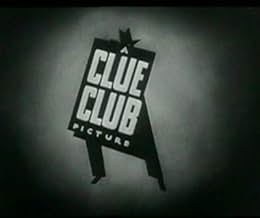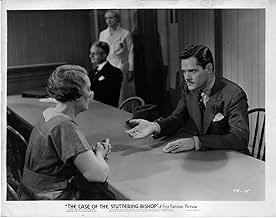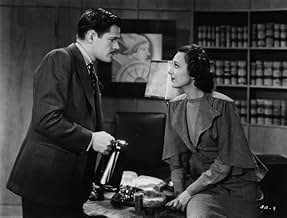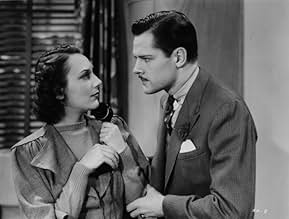An improbable stuttering bishop from Australia asks for Perry Mason's help in proving the identity of the legitimate heir to a millionaire.An improbable stuttering bishop from Australia asks for Perry Mason's help in proving the identity of the legitimate heir to a millionaire.An improbable stuttering bishop from Australia asks for Perry Mason's help in proving the identity of the legitimate heir to a millionaire.
- Director
- Writers
- Stars
Helen MacKellar
- Stella Kenwood
- (as Helen McKellar)
Charles C. Wilson
- Hamilton Burger
- (as Charles Wilson)
Eddy Chandler
- Detective James Fleet
- (uncredited)
- Director
- Writers
- All cast & crew
- Production, box office & more at IMDbPro
Featured reviews
Donald Woods stars as Perry Mason in "The Case of the Stuttering Bishop," a 1937 film that also stars Ann Dvorak as a lively Della Street. Frank Faylen is also on hand to pep things up a bit. Both of them are needed, because Donald Woods isn't terribly exciting. Of the men who played Perry Mason in the films, he is perhaps the closest rendering to the actual character. But the book Perry Mason was just that - for books - and it would take Gardner himself to not only choose Raymond Burr (the original Perry Mason was supposed to be Fred MacMurray until Gardner saw Mason at an audition for Hamilton Burger) but oversee the scripts to make the translation to the moving image.
The story concerns a mysterious bishop who asks Perry to help clear a woman accused of manslaughter many years earlier. From there, the story gets into mistaken identity - is a woman posing as an heiress or isn't she - and the solving of a murder. It's a very complicated plot, so pay attention. And Paul Drake is old. If you can sort it all out, you'll find it interesting. There's a little comedy to be had, which is helpful.
I like watching the Perry Mason movies, if only to see the different interpretations of the various roles and the emphasis put into the stories, but in the end, it's best to forget who these characters are supposed to be - because after watching the TV show for years, none of them are. So don't expect much in that department, and you won't be disappointed.
The story concerns a mysterious bishop who asks Perry to help clear a woman accused of manslaughter many years earlier. From there, the story gets into mistaken identity - is a woman posing as an heiress or isn't she - and the solving of a murder. It's a very complicated plot, so pay attention. And Paul Drake is old. If you can sort it all out, you'll find it interesting. There's a little comedy to be had, which is helpful.
I like watching the Perry Mason movies, if only to see the different interpretations of the various roles and the emphasis put into the stories, but in the end, it's best to forget who these characters are supposed to be - because after watching the TV show for years, none of them are. So don't expect much in that department, and you won't be disappointed.
We had two great evolutionary paths in the 30s. One was an amazing diversity of invention to settle some basic narrative devices that have since served us well as the basic vocabulary of cinema. The other, parallel path was the pulp detective novel, a master of which was Gardner.
The traditional, Holmes form is that you are linked to the detective. You discover what he does. Christie followed this form, but it is difficult to render in film. Gardner may be the first case — since common — of the novel adopting cinematic form. His formula does seem friendly to film: we see events that Mason does not, often before he gets seriously engaged. These events give us a false impression of what happened, so we as viewers start out with a deficit.
Then we have the detection; Mason and company are detectives in act two. The third act is always a courtroom, which is why our detective has to be a lawyer. Courtroom conventions have their own evolution in film, and this instance is limited to what in Christie's stories has to be a contrived assembly of the suspects.
This format allows for more complicated mysteries than were usual in film. My own preference for 30's detection is Philo Vance because the formula was not so strict. But this is a good one in terms of allowing complexity and surprise. We have that here in this solid instance.
One of the decisions in defining the characters is how intimate to make the relationship between alpha male Mason and his pretty and competent secretary. Why this matters has to do, as Mason would say, with motive. We like the guy. He is smart, as smart as other detectives, but why he does what he does
In some renderings of the Mason format, he just likes to win. He has his own Lestrade who he likes humiliating. Justice is incidental, and truth merely a tactic. He just like to strut.
In other renderings, he does what he does because he loves his team, his closest friend Drake and his lover Della. Both are profoundly loyal and true. He struts for her and we imagine passion after the obligatory Italian restaurant scene.
Here, a delicate balance between the two is maintained.
The traditional, Holmes form is that you are linked to the detective. You discover what he does. Christie followed this form, but it is difficult to render in film. Gardner may be the first case — since common — of the novel adopting cinematic form. His formula does seem friendly to film: we see events that Mason does not, often before he gets seriously engaged. These events give us a false impression of what happened, so we as viewers start out with a deficit.
Then we have the detection; Mason and company are detectives in act two. The third act is always a courtroom, which is why our detective has to be a lawyer. Courtroom conventions have their own evolution in film, and this instance is limited to what in Christie's stories has to be a contrived assembly of the suspects.
This format allows for more complicated mysteries than were usual in film. My own preference for 30's detection is Philo Vance because the formula was not so strict. But this is a good one in terms of allowing complexity and surprise. We have that here in this solid instance.
One of the decisions in defining the characters is how intimate to make the relationship between alpha male Mason and his pretty and competent secretary. Why this matters has to do, as Mason would say, with motive. We like the guy. He is smart, as smart as other detectives, but why he does what he does
In some renderings of the Mason format, he just likes to win. He has his own Lestrade who he likes humiliating. Justice is incidental, and truth merely a tactic. He just like to strut.
In other renderings, he does what he does because he loves his team, his closest friend Drake and his lover Della. Both are profoundly loyal and true. He struts for her and we imagine passion after the obligatory Italian restaurant scene.
Here, a delicate balance between the two is maintained.
Most of Edward McWade's roles were uncredited, but he certainly paid his dues in film-making; he had been making movies since 1919. Here he plays the stuttering bishop, who shows up at the office of Perry Mason (Donald Woods this time... Warren William had been playing Perry Mason for most of the 1930s.) with a case, then disappears. He makes accusations against the local rich man, Renald Brownley, played by Douglas Wood. Anne Dvorak and Joseph Crehan in supporting roles, as Mason confronts Brownley and tries to sort out the clues and what's going on. People start turning up dead, people are fighting, and then we're in the courtroom, like any good episode of Perry Mason. There are some comical moments, mostly between Mason and Della Street, and the names are a little confusing, with a Della, a Stella, TWO girls named Janice, and even an Ida. It's solid enough, with the usual court-room drama and outbursts. Directed by William Clemens, who had also directed many of the Nancy Drew and The Falcon films.
You can often tell when a studio is losing interest in a film series when they start replacing the entire cast. In this instance, they did it twice in 2 films-- and by the time of THE CASE OF THE STUTTERING BISHOP, we'd not only seen 3 Perry Masons in 6 films, but 5 different Della Streets! Donald Woods does his 2nd PM film, having played one of the suspects in ...THE CURIOUS BRIDE, while William Clemens directs his 2nd PM film, having already done the relatively sober ...VELVET CLAWS. Clemens would go onto quite a few series films, including a Torchy Blane, 4 Nancy Drews, a Dead Ends Kids, a Philo Vance, and 3 Falcons. There's nothing especially flashy or stylish about this film, and it starts out very confusing, but it is a solid mystery film, and gets better as it goes.
For example, you have the boastful house detective who Perry winds up hiring part-time, and as the story goes on he proves to be genuinely helpful, rather than "merely" comic relief. It seems the murder takes forever to happen in this one, but once it does, the story FINALLY kicks into gear, and the courtroom sequence at the end is probably the BEST in all 6 films. Unlike when Perry rattled off confusing info nobody but HE knew in the previous installment, the quick stream of witness testimonies actually help to pull all the threads of the story together neatly. And at last, there's the patented "blurted out confession" seen in so many PM stories-- only in this case, NOT from the person being grilled on the stand.
It's been said that sometimes casting actors very accurate to novels can lead to dull films. Some of the most popular versions of characters are quite unlike their literary sources-- good examples being Sean Connery's JAMES BOND and Stacy Keach's MIKE HAMMER. In this case, I find myself wishing Warren William had done more films like this one-- his version of Perry might not be thought of as so much of a joke then.
For example, you have the boastful house detective who Perry winds up hiring part-time, and as the story goes on he proves to be genuinely helpful, rather than "merely" comic relief. It seems the murder takes forever to happen in this one, but once it does, the story FINALLY kicks into gear, and the courtroom sequence at the end is probably the BEST in all 6 films. Unlike when Perry rattled off confusing info nobody but HE knew in the previous installment, the quick stream of witness testimonies actually help to pull all the threads of the story together neatly. And at last, there's the patented "blurted out confession" seen in so many PM stories-- only in this case, NOT from the person being grilled on the stand.
It's been said that sometimes casting actors very accurate to novels can lead to dull films. Some of the most popular versions of characters are quite unlike their literary sources-- good examples being Sean Connery's JAMES BOND and Stacy Keach's MIKE HAMMER. In this case, I find myself wishing Warren William had done more films like this one-- his version of Perry might not be thought of as so much of a joke then.
Donald Woods and Ann Dvorak were fine as Perry Mason and his secretary, Della Street, but it took me a while to get used to not seeing Raymond Burr in the Mason role. The complicated plot involves two women named Janice who claim to be the heir to the fortune of Douglas Wood, and an Australian bishop who asks Mason to see Mira McKinney, who can prove which one is the real one. But Wood is killed going to the rendezvous with McKinney, who is charged with murder. In customary Perry Mason style, there is a final courtroom scene (in this case only a hearing) where Mason flushes out the killer and the phony Janice. I enjoyed trying to follow the plot and the comedy that was prevalent. Tom Kennedy suddenly remembers an important item when he hears the name "Sampson," because it involves a ship called "Delilah." Woods always asking Dvorak to remind him to give her a raise when she gets a good idea (a running gag). Even the bishop, who explains he stutters only when under some emotional stress, provides some comedy at the end. He sheepishly stammers "g-g-goodness g-g-gracious" when three of the principal women kiss him goodbye.
Did you know
- TriviaAuthor Erle Stanley Gardner objected so vehemently to what he felt was the miscasting of Ricardo Cortez as Mason, that Warners replaced him with Donald Woods.
- GoofsNear the end, when Mason and his crew are having lunch during a court recess, Della drops her fork on her plate and reaches out across the table to break off some bread (after giving Mason the inadvertent hunch about Stella Kenwood). When the camera cuts back to Mason, Della has fork in hand again, but not the bread.
- Quotes
Perry Mason: [to Della] Bishops don't often need lawyers. Show him in.
- ConnectionsFeatured in Le grand sommeil (1946)
- SoundtracksWhen Irish Eyes Are Smiling
(1912) (uncredited)
Music by Ernest Ball
Lyrics by Chauncey Olcott and George Graff
Sung a cappella with a phony Irish brogue by Donald Woods
Details
- Release date
- Country of origin
- Language
- Also known as
- Clue Club #10: The Case of the Stuttering Bishop
- Filming locations
- Production company
- See more company credits at IMDbPro
- Runtime
- 1h 10m(70 min)
- Color
- Sound mix
- Aspect ratio
- 1.37 : 1
Contribute to this page
Suggest an edit or add missing content

